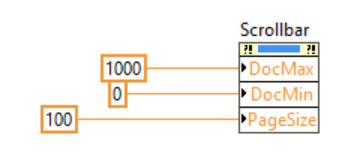-
Posts
6,217 -
Joined
-
Last visited
-
Days Won
120
Content Type
Profiles
Forums
Downloads
Gallery
Posts posted by Michael Aivaliotis
-
-
10 minutes ago, ShaunR said:
No library is dead whilst at least one person is using it.
Yup, there's so much development in OpenG, it's mind blowing.
If I see a tool, application or library that has no development activity in over 5 years, then I cannot trust that application, tool or library. That is a clear sign of intent on the part fo the developers. The message is loud and clear. This library, app or tool is dead, move on. That is a project risk.
-
The library is still useful. But it can be useful and dead at the same time.
-
So were the VIM versions ever incorporated into the latest OpenG?
-
3 hours ago, JKSH said:
Create Dir if Non-Existent
NI create directory does this already.
-
I don't know if JKI is now managing the packages from within GitHub or if those are dead repos. I guess JKI should chime in to explain.
For one thing. All the links to open.org are dead. So at least the packages need to be updated to remove that crap.
-
4 minutes ago, ShaunR said:
the incestuous dependencies means you that when you want a banana you get a banana, the gorilla holding the banana, the tree the gorilla sits in and the whole jungle surrounding it.
I love this analogy.
-
 1
1
-
-
Well, your comments are definitely valid for any tool distributed as a package. Not just OpenG. Also, for OpenG specifically, NI has started to incorporate some of the functionality of VIs from OpenG into the default distribution. There are numerous examples. It makes it even less attractive to use it. There are a handful of VIs in OpenG that I use that I wouldn't miss and could easily be replaced by creating replacements and dropping them into my own library. If there is no development or improvement of OpenG, then it becomes less useful and it just encourages people to roll their own.
I think if there is to be any development of OpenG then it should be moved from SourceForge into a different repository system like GitLab or GitHub. This way others can contribute. That would be a good start.
-
@0_o, thanks for the morning laugh! ? I guess I deserved that.
-
In this thread, a user makes a suggestion for an improvement to an OpenG VI.
Let's say we all agree and want to make changes to the OpenG ini VIs. Now what? What is the procedure to do this? How is this package managed and by whom?
In this thread @rolfk states the original authors have moved on and the library is pretty much archived. On the other hand, JKI has migrated the OpenG code to LabVIEW NXG. So there is some interest to keep it alive. What is the state of the union on OpenG? How are changes and improvements made, then released?
Is OpenG a dead library?
-
Reminds me of the most recent Microsoft update bug. They had to pull it:
https://www.engadget.com/2018/10/05/windows-10-october-update-1809-delete-data-wipe-user-profile/
-
I'm sure if you request that from JKI, they could help. But last I recall VIPM typically installs the installer in:
C:\ProgramData\JKI\VI Package Manager 20xx\updates\VIPM
This might have changed, but try there. Also, if the setup isn't there, look for the vipm-update.aiu file in that area. It's a text file that includes a URL to the installer.
PS: I don't work at JKI.
-
So basically, if someone forgot to wire the error out. Gotcha.
-
Thanks for the report. Can others reproduce this? Want to know if it's browser specific or associated with some other behavior.
-
On 11/1/2018 at 4:45 PM, ShaunR said:
Turning it (automatic error handling) off is is a code-smell for "cowboy coder"

If you don't already have a systematic way to manage errors in your code and are relying on automatic error handling exclusively, then that's a problem. Automatic error handling has some limited usefulness early on in development perhaps, to detect areas of your code that are not plugged into your current error handling system. However you shouldn't depend on it exclusively for handling errors.
-
On 11/14/2018 at 7:38 AM, Aristos Queue said:
I happen to double-click on one of those ? nodes. And, lo, the missing VI opens. Say what?
The icon has a question mark but it's bold and solid. Not grey and dimmed. Missing VIs or nodes show up dimmed.
-
17 hours ago, Benoit said:
Why NI do not provide this as a workaround?
NI doesn't know everything.
-
 1
1
-
-
Don't use the NI LabVIEW installer. Use the installer distributed from JKI. Uninstall VIPM then install it form JKI. Never use the NI installer for VIPM.
-
Do people still use ini files? I mean XML, Json? What is the consensus. Should any effort be put into this? Yes, the MGI tool is way faster. Yes, I'm derailing this post...
-
7 hours ago, Yair said:
Thanks, that looks like it should work. Where did you find the ID part of the URL?
I was already subscribed and looked at what my podcast player (Apple podcasts) was using as the URL. So ya, I cheated.
-
Well technically, an event frame is for user events. If you programmatically resize the panel (which is not a user action), then it's your job to tell everyone to fix themselves. Sure we could argue forever on that one point. But it seems much less hacky to send a panel resize cleanup message than to jiggle the splitters. Imagine someone trying to read your code and figure out why you're jiggling the splitters.
-
1 hour ago, Yair said:
Can you publish the RSS feed for the podcast so that people using other apps can also subscribe?
Try this:
https://anchor.fm/s/71f9ee0/podcast/rss
Also, if you go to the podcast homepage on Anchor, click on the button that says: Listen in your favorite app.
-
 1
1
-
-
I assume you already have a mechanism to send messages to these sub-paneled VIs? Could you use that?
-
Ya, that's strange. I tested it on chrome and safari and it looks fine for me.
I notice the dots are working and the discussion round icon is dimmed. So it seems it's partially working, but not the bolding?What browser? Chrome?
-
The scrollbar is behaving as it should. I suggest you create property nodes for the scrollbar and investigate the help on those. When you create a brand new scrollbar it sets the DocMax and DocMin to 10 and 0 respectively. It uses that as a reference if you don't set them yourself. So when the data fed to the scrollbar exceeds 10 then LabVIEW automatically adjusts the scrollbar slider width to handle the visualization of the larger data. LabVIEW also takes into consideration the actual width of the scrollbar as well. So if you stretch it out then the slider will resize larger accordingly.
If you wanted to make the slider wider, then you need to set the PageSize property to be a certain fraction of DocMax. Since the default is probably 1, which will make the slider super-thin.




The State of OpenG (is OpenG Dead?)
in OpenG General Discussions
Posted
Based on this discussion thread, there are clearly improvements and restructuring that could be done to make the toolkit better. Even if you look back at old threads for suggestions. Currently there is no mechanism and no plan to do this. Bug reports and suggestions get ignored or go into a void. Documentation is missing or broken with no intent to be fixed. New improvements and efficiencies in LabVIEW have not been incorporated. Etc. I guess my assumption of OpenG was an ongoing community effort to build a great toolkit. I'm not seeing the ongoing community effort part.
I don't get that from your site at all. If someone contacts you about a bug to your tool, do you ignore it? I assume no.